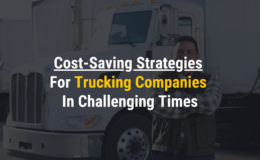The current climate in the trucking industry is experiencing pressures from tariffs, technology, legislation, and gaps in the workforce. While trucking rates have seen an increase over the past months, despite doom and gloom analysts, e-commerce has been making significant inroads.
Many small trucking companies are serving online shipments, and OTR truckers are breaking away from their regular jobs to start their own businesses to generate higher revenue with e-commerce.
A Shift in How We Do Business
Not too long ago, online shopping was considered a very niche subsection of shipping, typically handled by UPS, FedEx, DHL, and USPS. Last year, there was a major uptick in e-commerce and a decline in people shopping at major retailers. With the exception of Amazon and Wal-Mart, most online retailers do not have their own fleets.
With the rise of e-commerce, a new submarket has opened up in the trucking industry, and OTR truckers see a chance to launch their own companies or become true owner-operators and improve their bottom lines as consumers shift to e-commerce.
This Isn’t a Competition
Nothing seems to be slowing down e-commerce, though the submarket should not be seen in direct competition with large carriers. The way the trucking industry runs now, keeping e-commerce relegated to the major carriers would place undue stress on OTR drivers and fleet owners.
E-commerce customers are expecting last-mile services and fast deliveries. Major fleet owners do not have the resources to take items from the shipper to the customer’s home or business. On the other side of the coin, small carriers cannot handle the volume of large trucking companies.
By getting into online shopping, small fleets and owner-operators can fill a vacuum and maintain a driving radius that keeps them close to home. Having people who understand trucking companies fill the void and bring online shopping into the larger picture can benefit everyone.
The Future of E-Commerce
E-commerce is no longer a small segment, nor is it only a seasonal concern. E-commerce is here, and we cannot rely on online companies building their own fleets.
As online shopping starts to include larger items, we are going to see more dedicated supply chains created to bridge the gap between sellers and customers without placing an added strain on more traditional carriers, to even further the annual revenue of the trucking industry.







